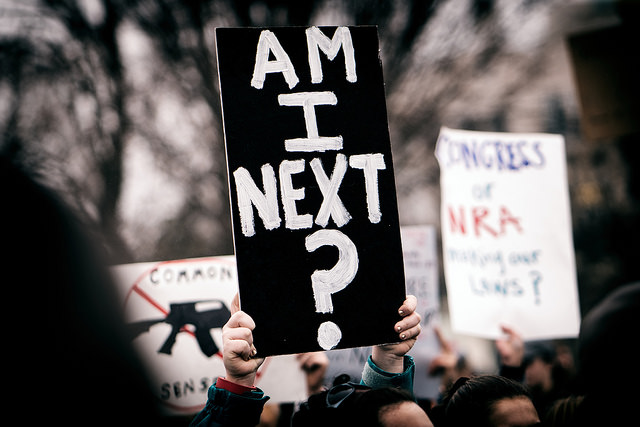Eric
Is any place on the web as awful at YouTube? At the NYT, Zeynep Tufekci explores how YouTube fosters extremism, political radicalism, and conspiracy theories.
Or maybe Reddit is the most awful place on the internet. At the New Yorker, Andrew Marantz explores the ongoing struggle (and failure) to detoxify Reddit.
At Slate, an argument for running from the pain. Literally: “In clinical studies, regular aerobic exercise is as effective as antidepressants in reducing symptoms of mild to moderate depression.” It’s worth a read about why exercise works and why it isn’t more commonly accepted in American medical practice.
Aven
I was so, so inspired by all of the student activism yesterday calling for gun control. From elementary schoolers all the way up to university students, and from brave individuals walking out of their schools alone to floods of students taking the streets, from 11-year-olds with homemade press packets to high schoolers who were barred from returning to class and then punished for truancy, these kids are dauntless, creative, and courageous. I even learned via Facebook that a distant cousin of mine led his own demonstration at a high school in Detroit, in the face of opposition from school administrators. If only the adults in the US had half as much spine.
In other happy news, Alex Jones is finally getting his comeuppance after years of spewing bizarre and unfounded conspiracy theories to anyone who will listen.
I try my best to avoid canned food these days, since apparently they are all lined with either BPA or with some mysterious BPA replacement that may be even worse, so I was relieved to learn that aseptic cartons are becoming easier to recycle.
And finally, I know some people might be tired of special elections at this point, but the new senate seat that just went up for grabs in Mississippi promises to be an especially interesting affair. From FiveThirtyEight:
Here’s how everything will play out. Under Mississippi law, Republican Gov. Phil Bryant will appoint a new senator to take over for Cochran until a special election is held this November (concurrently with the regularly scheduled midterm elections). There is a catch, though: Special elections in Mississippi are nonpartisan; that is, party affiliations aren’t printed on the ballot, and — instead of party-specific primaries — all candidates will run in one free-for-all of a race. If no one gets a majority of the vote in the first round, the top two finishers will face off in a runoff election.
It’s a democracy experiment in action!
Kristin
Because I’m a sucker for punishment, I listened to the Hidden Brain episode “Men:45, Women: 0” about the double-bind women face of being either likable or strong, but not both. I’ve heard that part before, but there was a new tidbit: when shown a face with a negative emotion and asked why that person is feeling that emotion, both men and women describe men’s moods as caused by external circumstances (something bad happened to him today) and women’s because of internal characteristics (she’s neurotic).
An interesting argument that austerity led to the rapid rise of the Nazi party in Weimar Germany:
We argue that it was not just the absence of a coherent response to social suffering from government, but also the austerity policies that worsened it leading the electorate to radicalise. With dashed hopes and a loss of faith in the Weimar Republic, fury and despair were channelled into the ranks of populists and demagogues, with the Nazi party campaigning against austerity and offering promises for a new era of prosperity. The lowest status groups and the unemployed turned to the Communists, but those just above in the economic hierarchy . . . favoured the Nazis.
Dan
Every Sunday I get to peruse a paper copy of the New York Times (a perk of living with my better half) and usually hit the op-ed section first. So I was happy to have Vox’s David Roberts help me understand why the conservative voices so often feel sort of limp, or something. Roberts argues that the NYT is insulating its readers from the true voices of conservatism, because, well, maybe they aren’t fit to print?
Here is the scary truth that NYT editors and readers alike resist: US politics today is not a contest of ideas or governing philosophies. We are witnessing a massive revanchist upheaval — against bourgeois morality and standards of conduct, against changing demographics and economies, against assumptions about governance and respect for norms, against the status quo — by a culture that is stagnating even as the country changes around it, which it experiences as a loss of dignity and prestige.
Not everyone involved is driven by tribal resentment, not every Trump voter indulges in misogyny or racism, but every member of the current conservative coalition has decided that those things are acceptable, or at the very least, not disqualifying — less important than lower taxes or immigration crackdowns.
Even if they do not share Trump’s ignorant, hateful impulses, even if they do not endorse his careening, incompetent governance, even if they do not countenance the grotesque corruption of his family and his administration, they support the coalition that enables those things. They are supporting a tribe with a strongman leader, not a set of ideas.
John
Readers may know of the National March for Our Lives, planned on March 24 in Washington D.C. to encourage lawmakers to stand up to the National Rifle Association (NRA) and take action to reduce gun violence. “Sibling” events are also planned around the world: 743 of them, as of the evening of March 14. These include at least one in each state/province covering Cascadia, and readers can zoom in on this map to find details.
Mother Jones recently ran a profile of Scott Pruitt, EPA’s administrator for Donald Trump, with the title, “Making America Toxic Again.” Among other observations, the article warns that Pruitt has his sights set on higher office.
In more uplifting news, staff members of the New York Times covering the Pyeongchang, Korea Winter Olympics shared their favorite moments. Among the examples, one reporter noted that other news events he had covered, “could not match this one for its athletic and geopolitical resonance.” In that vein, another mentioned the unified Korea women’s hockey team. They lost all their contests, but after their final game, ‘The players formed a circle in the middle of the rink and brought their sticks down in a resounding crack, while the crowd chanted, ‘We are one!’”
In the “isn’t science interesting?” category, the Los Angeles Times noted two published scientific papers reporting on the possible interaction between “dark matter” and hydrogen in the early universe. As one astrophysicist not involved in the research observed, “You need new physics in order to explain” the signal they detected.








